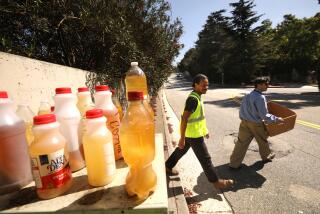In Complaint to Riverside Schools, Toilet-Humor Book Doesn’t Amuse
- Share via
The stink started with a picture drawn by Pam Santi’s 7-year-old grandson.
“It was disgusting,” said the Riverside resident. “He was drawing a piece of poop.”
More specifically, Taylond, a second-grader, was sketching Deputy Doo-Doo, the villainous character in “The Adventures of Super Diaper Baby” by Dav Pilkey.
The book is part of the author’s bestselling “Captain Underpants” series, which presents such subjects as talking toilets, troublemaking cafeteria ladies from outer space and a mad scientist named Professor Pippy P. Poopypants.
Santi, who is also guardian of her grandson, was appalled to find that the scatological story was available at his school, John F. Kennedy Elementary. She filed a formal complaint last month with the Riverside Unified School District and asked that librarians remove “Super Diaper Baby” from their shelves.
On Wednesday, a seven-member committee, composed of parents, teachers and administrators, will begin reviewing Santi’s complaint.
Written and illustrated in comic-book style, the story follows Super Diaper Baby’s battles with Deputy Doo-Doo, a walking, talking, evil piece of excrement enlarged after an accidental fall into a nuclear reactor.
Not only does “Super Diaper Baby” promote toilet humor, Santi said, but its 125 pages also encourage irreverence to authority, overflows with intentional misspellings and offers a 12-point lesson on how to draw Deputy Doo-Doo -- sheriff’s hat and all.
“I didn’t appreciate it,” Santi said.
In response to Santi’s complaint, some literacy advocates said they deplore her attempt to ban a book that they say has enticed millions of children nationwide to read rather than watch TV or play video games.
“It’s not the role of a librarian to decide what people should read” but to supply the books and, if asked, make recommendations, said Beverley Becker, associate director for the American Library Assn.’s Office for Intellectual Freedom.
Last year, the Chicago-based group tracked 515 challenges to remove or restrict publications -- a number that is not definitive and has remained fairly steady throughout the years, said Becker, adding that most school and public libraries balk at bans.
Most targeted books contain sexually explicit passages and language considered offensive, the association found. But J.K. Rowling’s bestselling “Harry Potter” novels ranked as the most frequently challenged in 2002. Those critics contend that the stories promote witchcraft and Satanism.
“Captain Underpants” landed on the library association’s list as the sixth most frequently challenged book.
Through his publisher, Scholastic Inc., Pilkey declined to comment.
In a prepared statement, the publisher defended the series, noting that it has won several awards and receives hundreds of letters each week from parents and teachers praising the books “for transforming [children] into eager readers.”
On a back page of the “Super Diaper Baby” book, the publisher addresses controversy over its content less solemnly:
“If you were offended by this book, please send a self-addressed, stamped, business-sized envelope,” the statement says, “and we’ll send you more offensive stuff.”
Santi’s was the first formal Pilkey-related complaint in the Riverside district. Earlier this school year, Riverside Unified discussed and denied two parental attempts to expunge Ray Bradbury’s “Fahrenheit 451” and Sandra Benitez’s “A Place Where the Sea Remembers.”
The district receives a handful of formal complaints each year regarding books with dark themes, strong language and sexual content, said librarian Christine Allen, who heads the committee deciding the fate of “Super Diaper Baby.”
Since 1989, when Allen began tracking formal complaints, the only request granted occurred seven years ago when officials yanked Robert Cormier’s “The Chocolate War” from middle-school libraries because of profanity and a masturbation passage.
Removing “Super Diaper Baby” would require a majority vote by the district committee. Because the book is not mandatory reading, the group’s decision is not subject to school board approval. But if Santi loses and appeals, the case would move to the Riverside County Office of Education and, if still unresolved, the state Department of Education.
Allen declined to give her opinion of “Super Diaper Baby,” saying she does not want to influence other committee members.
Other librarians say kids’ enjoyment of Pilkey’s books helps cement reading as a lifelong habit.
Just as an adult’s nightstand might have People magazine and a Pulitzer Prize-winning biography, children should be allowed to read a range of material, lest they look at books as a chore, many librarians say.
Librarians also respect a parent’s right to decide what their children read, and expect that schools will respect their choices, said Barbara Genco, a public librarian in Brooklyn and president of the Assn. for Library Service to Children.
It’s also natural for children ages 7 to 10 -- Pilkey’s target audience -- to find bathroom humor funny, said Diane Halpen, a psychology professor at Claremont McKenna College.
Doing so helps children accept their bodies, Halpen said. It also eases confusion because children will recall being praised during potty training, she explained.
Santi accepts that her “energetic and curious” grandson enjoys toilet talk, but it’s a topic he’s not allowed to broach in an unnecessary manner. She’s certain other parents feel the same way.
“They might not know their kid is reading about poo-poo, or whatever you want to call it, at school,” she said. “There’s just no moral value to that poop character.”
More to Read
Sign up for our Book Club newsletter
Get the latest news, events and more from the Los Angeles Times Book Club, and help us get L.A. reading and talking.
You may occasionally receive promotional content from the Los Angeles Times.










